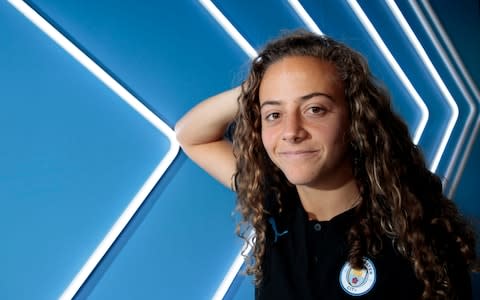Matilde Fidalgo interview: Bernardo Silva's second cousin on blazing a trail in her right at Manchester City


Given Matilde Fidalgo ended up signing this summer, aged 25, for the same club as her second cousin, the Manchester City midfielder Bernardo Silva, it is ironic that she did not know they were related for the first 20 years of her life.
Even cocooned in the bubble of City’s gleaming Etihad Campus, where the men’s and women’s teams live in such proximity that the former City striker Nikita Parris is close friends with Raheem Sterling, and Pep Guardiola once spent half an hour watching Toni Duggan completing shuttle runs, she likely would have walked past Silva and not known of their familial bond had it not been for a 50th birthday party.
“It was my mom’s friend’s birthday,” explains Fidalgo. “He was mutual friends with Bernardo’s mom. My mom and Bernardo’s mom did not know each other, but they recognised that they probably were related because they sounded similar and they looked similar. Then his mother recognised me: ‘You used to play against my kid – my kid is Bernardo.’
“When I started playing football, I started playing against the boys – his mom recognised me because I was the only girl in the championship. Back then, I did not know who he was, because he was still in the younger teams in Benfica. I had no idea he was my cousin. Then, the year after, he got really famous.”
In those days, Bernardo was little more than a fleeting presence in the childhood Fidalgo spent pretending to be the Brazilian Ronaldo. She and Silva are, however, more alike than they realise.

Beyond the shared career is a shared intellect: Silva is considered one of the cleverest players in the Premier League, not only for his obvious game intelligence but the degree in European Studies at the University of Lisbon that he had to abandon once his professional career took off.
Fidalgo is similarly quick. She speaks perfect English, visited the Consulate General of Portugal to speak about City and was invited by the Portuguese federation to chair a debate, alongside professors, on leadership in sport.
The Portuguese federation reunited Silva and Fidalgo in 2017 after getting wind of their connection – they share great-grandparents – but Fidalgo, in those years spent in Portugal’s embryonic women’s league, never felt she would emulate Silva’s career trajectory so closely.
Her cousin’s journey from Benfica to Monaco to Manchester, and her one – from CF Benfica to these shores via Sporting Lisbon and SC Braga – are summarised, jokingly, with the words: “Mine hasn’t been as fancy as his”.
Even now, in the environs of City’s £200 million Etihad Campus, it remains something of an understatement. The men’s leagues in Portugal offered incentives to spawn women’s sides and at Sporting she signed her first professional contract.

“They had professional contracts with most of the players. But in Portugal there are only two professional teams. Now, Benfica is professional as well, but they’ve just got to the first league. Most teams are amateur. The facilities aren’t good because most teams that have women’s football are not very wealthy.
“Most of the players work during the morning so they can only practise during the night. At Man City, all the players being able to play in the morning is a great thing. It’s not just the teams that are very different – it’s the entire league.”
It was Silva’s mother, a teacher, who led the sales pitch when word of City’s interest reached Fidalgo this summer. “She said I would love it, that the people working here were great – very professional.”
When she arrived in England, Silva offered her help finding a house – in the event, she found one while Silva was in China. “I did not want to bother him. But he’s super nice. They spoke very highly about Manchester.”

For her own part, she has adapted quickly to life but has only one complaint. “There’s no beach to go to,” she says, “which, for me, is a bit sad, but it’s nice.”
It is a minor issue, though, given all she has won by moving to Manchester. “Here we have the stadium just for us, for the women’s team,” she says, “Back there [Portugal], we had to share it with other teams. Some of the players were also studying. It was not as easy to do both things.”
She can empathise, having gained a master’s degree in environmental and energy engineering during her transition from amateur to professional. “Football doesn’t last for ever,” she says. “My degree was about renewable energies, and I think that’s the future. I think there’s going to be space for me in that area.”
PUMA athlete Matilde Fidalgo will wear personalised FUTURE boots

 Yahoo Sport
Yahoo Sport 





































